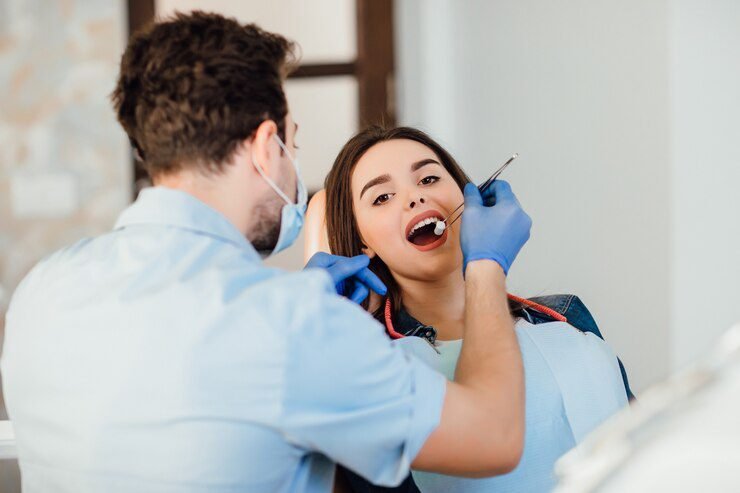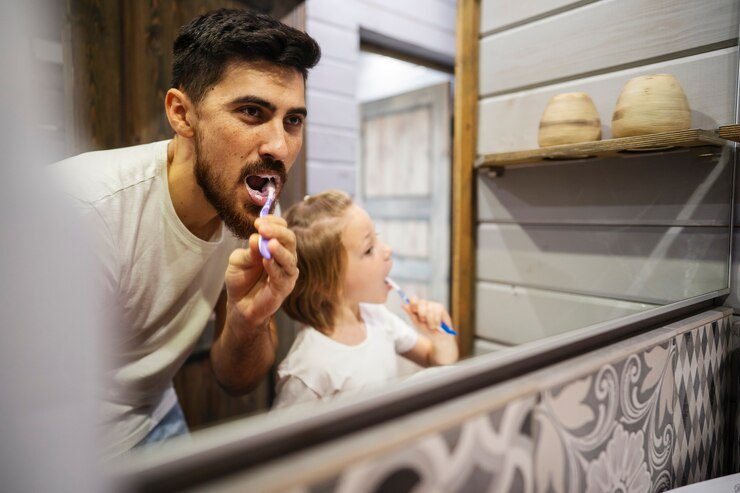Physical Address
304 North Cardinal St.
Dorchester Center, MA 02124
Physical Address
304 North Cardinal St.
Dorchester Center, MA 02124

Find tips to conquer your gag reflex for a more comfortable dental visit.

Maintaining good oral hygiene is essential for overall dental health. By adopting a regular dental routine at home, you can ensure healthy teeth and gums. The foundation of oral hygiene is brushing your teeth at least twice a day with a fluoride toothpaste. This helps remove plaque and bacteria that can cause tooth decay and gum disease. Don’t forget to brush your tongue gently as well, as it can harbor bacteria that contribute to bad breath.
In addition to brushing, flossing plays a crucial role in maintaining oral hygiene. As toothbrush bristles cannot reach between your teeth, flossing is necessary to remove food particles and plaque from these hard-to-reach areas. Make sure to floss between each tooth, using a gentle back-and-forth motion. If you find traditional floss challenging to use, consider using interdental brushes or water flossers, which can be equally effective.
Furthermore, incorporating mouthwash into your dental routine can provide additional benefits. Mouthwash helps kill bacteria that may remain in your mouth even after brushing and flossing. It can also freshen your breath and reduce plaque build-up. Consult with your dentist to determine the most suitable mouthwash for your specific dental needs.
Maintaining your oral hygiene at home is only one piece of the puzzle. Regular dental check-ups are also crucial for a comprehensive dental care plan. Your dentist can provide professional cleaning, perform a thorough exam, and identify any potential issues before they escalate. Remember, prevention is key when it comes to dental health.
This table summarizes tips for maintaining oral hygiene at home, promoting healthy teeth and gums:
| Dental Hygiene at Home: Tips for Maintaining Oral Health | Description |
|---|---|
| Brush Twice Daily | Brush teeth at least twice a day, using fluoride toothpaste and a soft-bristled toothbrush. Brushing removes plaque, bacteria, and food particles from the teeth, preventing tooth decay and gum disease. |
| Floss Daily | Floss between teeth once a day to remove plaque and debris from areas where toothbrush bristles cannot reach. Flossing helps prevent cavities, gum disease, and bad breath by cleaning between teeth and along the gumline. |
| Use Mouthwash | Rinse with an antimicrobial mouthwash to help reduce plaque and bacteria, freshen breath, and promote gum health. Choose a mouthwash with fluoride for added cavity protection and follow manufacturer’s instructions for use. |
| Maintain a Balanced Diet | Eat a balanced diet rich in fruits, vegetables, lean proteins, and whole grains. Limit sugary and acidic foods and drinks, which can contribute to tooth decay and erosion. Drink plenty of water to stay hydrated and rinse away food particles and acids. |
| Limit Sugary Snacks and Drinks | Minimize consumption of sugary snacks and beverages, such as candies, sodas, and fruit juices. Sugary foods can fuel bacteria in the mouth, leading to tooth decay and cavities. Opt for healthier snack options like fruits, nuts, and cheese. |
| Chew Sugar-Free Gum | Chew sugar-free gum after meals to stimulate saliva production, which helps neutralize acids, remineralize tooth enamel, and wash away food particles. Look for gum with xylitol, a natural sweetener that may help prevent cavities. |
| Replace Toothbrush Regularly | Replace toothbrush every 3 to 4 months or sooner if bristles appear frayed or worn. A worn toothbrush may be less effective at removing plaque and bacteria, compromising oral hygiene. Consider using an electric toothbrush for thorough cleaning. |
| Protect Teeth During Sports | Wear a mouthguard during sports and recreational activities to prevent dental injuries such as chipped or knocked-out teeth. Custom-fitted mouthguards provide the best protection and can be obtained from a dentist. |
| Schedule Regular Dental Check-Ups | Visit the dentist for regular check-ups and professional cleanings every 6 to 12 months, or as recommended by your dentist. Dental exams allow early detection and treatment of oral health issues, ensuring optimal oral hygiene and preventing dental problems. |
| Practice Good Oral Hygiene Habits | Develop and maintain good oral hygiene habits, including proper brushing and flossing techniques, regular dental check-ups, and avoiding tobacco use. Consistent oral care is essential for preventing tooth decay, gum disease, and other oral health problems. |
It is recommended to brush your teeth at least twice a day, preferably in the morning and before bed.
It is recommended to brush your teeth for a minimum of two minutes each time you brush.
It is recommended to use a soft-bristled toothbrush to avoid damaging your gums and tooth enamel.
It is recommended to replace your toothbrush every three to four months or sooner if the bristles become frayed.
While not necessary, using mouthwash can provide additional benefits such as freshening breath and reducing plaque.
It is recommended to floss your teeth at least once a day to remove plaque and food particles from between your teeth.
Yes, it is recommended to gently slide the floss between your teeth and curve it into a C shape, following the contour of each tooth.
Yes, it is important to clean your tongue as it can harbor bacteria and cause bad breath. You can use a tongue scraper or your toothbrush to gently clean your tongue.
While some natural remedies may have anecdotal benefits, it is always best to consult with your dentist before incorporating them into your oral hygiene routine.
It is recommended to visit the dentist for regular check-ups and cleanings every six months or as advised by your dentist based on your oral health.